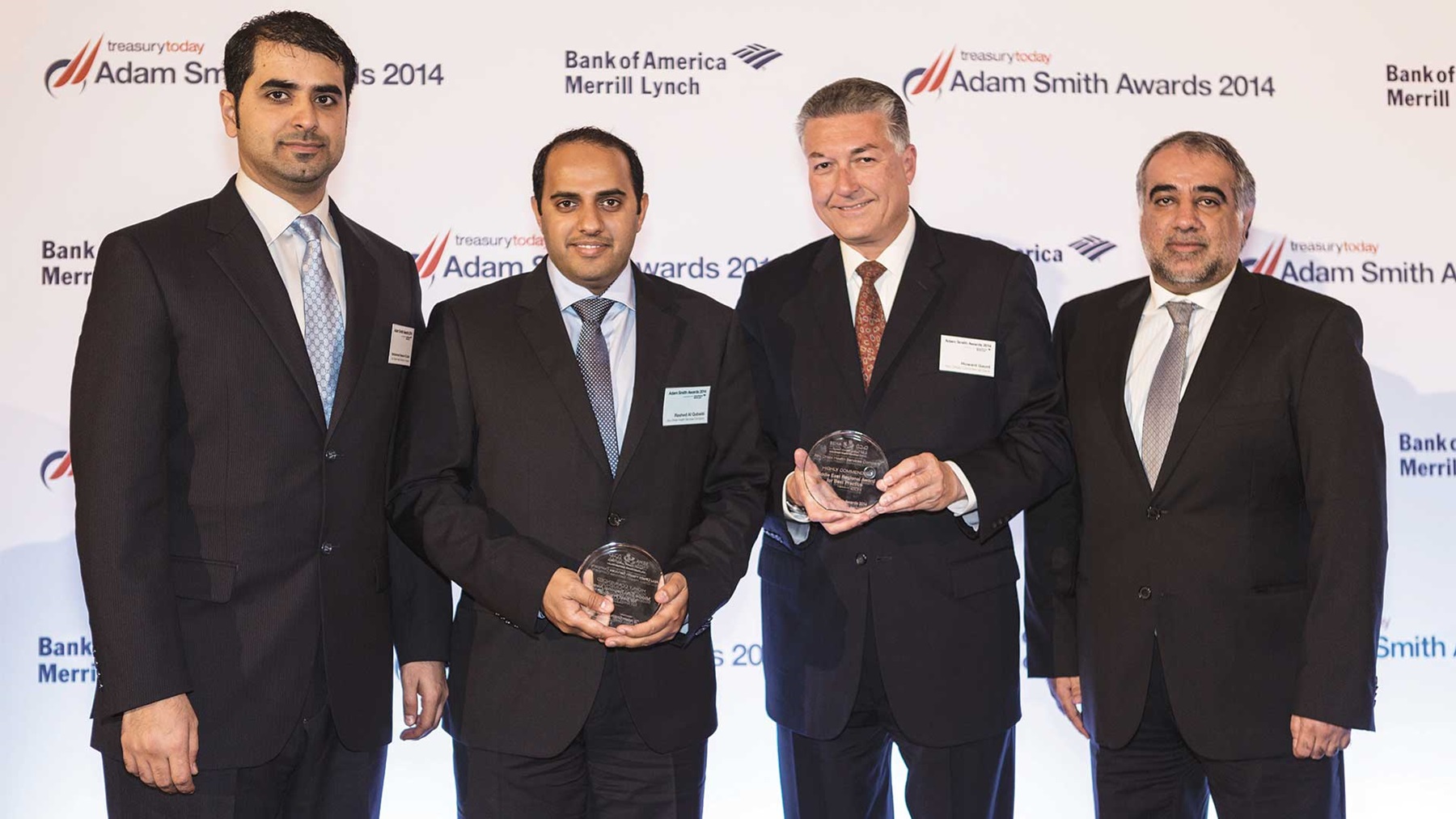
Photo of Rashed Al Qubaisi of Abu Dhabi Health Services Company collecting the Award on behalf of Bernhard Solleder and Howard Gaunt and Mohamed Al Ali of Abu Dhabi Commercial Bank.
The collaboration between this company and its bank in Abu Dhabi has resulted in one of the first custom-designed, automated payment processes in the region, leveraging industry best practices and applying them to address specific local financial requirements.
Bernhard Solleder
Director Group Finance and Business Development

The Abu Dhabi Health Services Company (SEHA) was established in 2007 with nearly 18,000 employees as part of the Abu Dhabi government’s ongoing healthcare reforms programme. Its aim is to provide the UAE’s citizens with local access to world-class healthcare facilities.
in partnership with

The challenge
SEHA has ten business entities (hospitals and centralised services) managing their own finance function. Each entity has four bank accounts, resulting in 40 accounts at a group level. “As a result of our decentralised model and large number of bank accounts, it was difficult to achieve timely, accurate visibility of funds at a group level or consistency over financial processes,” explains Bernhard Solleder, Director Group Finance and Business Development.
All SEHA’s cash and treasury processes, including payments, had been carried out on a manual basis. The minimum time for approving an invoice was ten days and there was no ability to track the status of a payment throughout its life cycle. Errors and late payments were therefore common, potentially damaging supplier relationships and increasing risk in its supply chain.
The solution
To address these challenges, SEHA took the decision to automate its procure-to-pay process by developing a custom workflow in its ERP (Oracle) that would specifically meet its requirements. It would also integrate the solution with its banking partner, Abu Dhabi Commercial Bank (ADCB) via a real-time, host-to-host connection. New electronic payment files are now transmitted to ADCB’s designated file location every 30 minutes. These are now retrieved and validated prior to execution, with prompt notification of acceptance or rejection, allowing the company to make any necessary corrections instantly and sending fresh files without compromising the value date.
“This approach was more cost-effective and less resource-intensive than implementing a specialist payments system, and allowed us to develop processes that met our needs more precisely. Furthermore, we were able to leverage ADCB’s expertise in efficient payments processing,” explains Mr Solleder.
ADCB provided details on the required payment formats, including advice on encryption, in order to ensure accurate, robust and secure straight through processing. The implementation proceeded smoothly with a high-quality approach to project management, including extensive testing. This in turn increased user trust and confidence in the new solution, as well as processing accuracy. By designing a new workflow that met its needs exactly, SEHA has been able to achieve a high degree of acceptance by both internal staff and suppliers, whilst demonstrating industry best practices in process efficiency, security and resilience.
Best practice and innovation
The collaboration between SEHA and ADCB has resulted in one of the first custom-designed, automated payment processes in the region, leveraging industry best practices and applying them to address specific local financial requirements.
“As a result of this project, we are now in a position to implement further enhancements to our infrastructure, such as introducing an automated payroll processing solution, automated internal funds transfers and automated reconciliation. We are also considering implementing cash pooling solutions such zero-balancing accounts (ZBAs) which will enable us to have much greater visibility over our group cash position and optimise the utilisation of funds across the SEHA group,” says Mr Solleder.
Key benefits
-
Cost savings:
$1.4m per annum.
-
Environmental savings:
Eliminated 288,000 pages per annum from its processes, significantly reducing its environmental footprint.
-
Accelerated workflow:
Reduced the invoice processing life cycle from ten to two days.
-
Enhanced payments security:
By encrypting Electronic Funds Transfer (EFT) files before transmitting them to the bank via the host-to-host (H2H) connection, SEHA is meeting industry standards for information security and safeguarding suppliers’ critical information such as banking details.
-
Achieved information transparency:
Payments are now tracked throughout the payment processing life cycle.
-
Improved cash flow forecasting:
By accelerating payments processing SEHA can position funds more accurately.
-
Reduced supplier risk.
Increased staff and patient satisfaction.